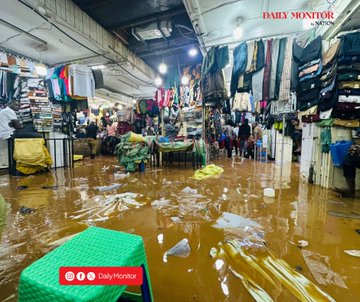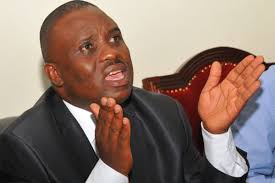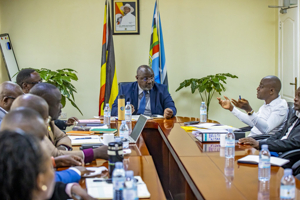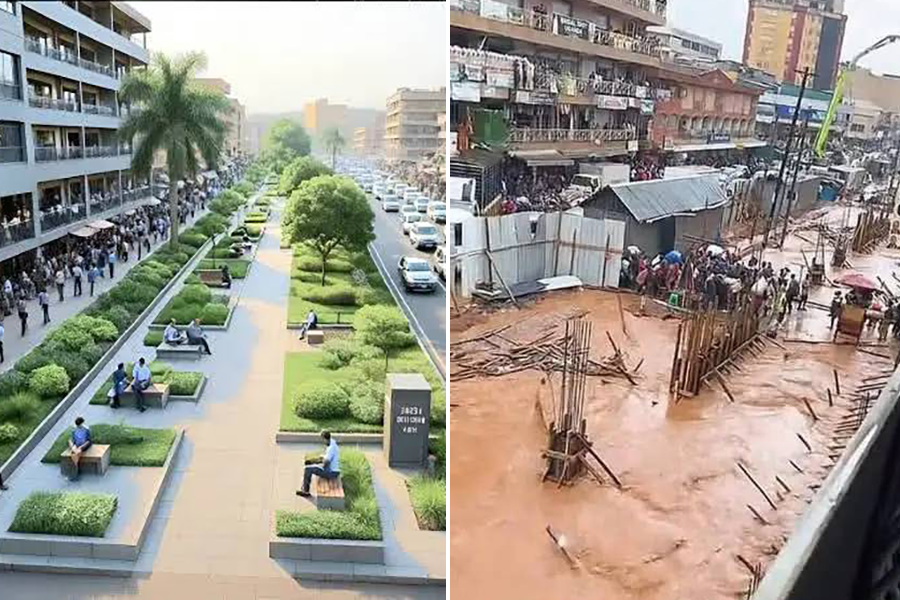Kampala, the bustling capital city of Uganda, recently endured severe flooding after days of heavy rains, leading to tragic loss of lives and extensive damage to property. This climatic disaster reignited an already heated public conflict involving Kampala Lord Mayor Erias Lukwago and prominent businessman Hamis Kiggundu, whose redevelopment works along the Nakivubo drainage channel have drawn sharp criticism.
As public anger worsens and political tensions rise, the Kampala Capital City Authority (KCCA) and Lord Mayor Lukwago find themselves at the center of a storm both literal and figurative with city residents baying for answers, accountability, and lasting solutions. This blog post unpacks the events, the accusations, the political undercurrents, and what this means for Kampala’s future.
Kampala’s Flooding Crisis: A Recurring Nightmare
Heavy rains in early October 2025 overwhelmed Kampala’s aging drainage infrastructure, causing floodwaters to spill onto streets, homes, and businesses. At least seven fatalities were reported, alongside numerous cases of property destruction and disruptions to the city’s economic activities. The flooding crisis is not new for Kampala: for years, residents and experts have decried inadequate drainage systems, encroachment on waterways, poor urban planning, and insufficient funding to address these perennial challenges.
At the heart of the flooding misery is the Nakivubo Channel, a vital drainage system responsible for directing stormwater away from the central business district. However, years of neglect, siltation, waste dumping, and illegal constructions along its banks have severely compromised its efficiency.
Lukwago Points Fingers at Hamis Kiggundu
In the immediate aftermath of the October floods, Lord Mayor Erias Lukwago publicly blamed the floods partly on the construction activities of Dr. Hamis Kiggundu, a well-known real estate developer. Lukwago accused Kiggundu’s commercial structures, allegedly erected directly atop sewage lines and key drainage channels near Nakivubo, of obstructing water flow and exacerbating the flooding.
Lukwago further contended that Kiggundu colluded with former KCCA Executive Director Frank Nyakana Rusa to approve projects that compromised the drainage system. He described the flooding as “sheer recklessness and impunity” from Kiggundu and certain government actors. Lukwago has called for investigations and accountability.
This public accusation intensified tensions between KCCA councilors, the Lord Mayor’s office, and Kiggundu’s enterprises, setting the stage for a fierce dispute.
KCCA Responds: War of Words and Political Backlash
Following Lukwago’s allegations, a faction within KCCA, including elected councilors supportive of the city authority’s ongoing public-private partnership efforts, strongly defended Kiggundu and the redevelopment projects. They pointed out that Ham Enterprises (U) Ltd., Kiggundu’s company, legally secured approval from KCCA’s technical committees and council for the drainage-related works in December 2024.
These projects involve covering portions of the Nakivubo Channel to modernize and expand commercial activities while improving drainage capacity efforts endorsed by President Museveni as part of transforming Kampala into a flood-free, modern city.
KCCA councilors dismissed Lukwago’s allegations as politically motivated attacks aimed at personal and political gain rather than genuine concern for residents. They argued the real causes of flooding lie in chronic underfunding, poor solid waste management, and decades of urban encroachment unrelated to Kiggundu’s efforts.
Hamis Kiggundu’s Cleanup Initiative Amid Controversy
Despite controversies, Kiggundu has spearheaded a massive cleanup initiative employing heavy machinery to remove accumulated solid waste and desilt clogged sections of the Nakivubo drainage system. He defends his projects as patriotic, aimed at safeguarding Kampala’s future from frequent floods, while simultaneously generating commercial revenue that can be reinvested in urban infrastructure.
Kiggundu criticizes detractors for politicizing infrastructure development and obstructing progress. His position is bolstered by support from government entities, including President Museveni's endorsement of his initiative as a vital public-private partnership.
Public Reaction: Frustration and Demands for Leadership
City residents and stakeholders are caught in the middle of this political tug-of-war, raising urgent demands for effective leadership and long-term solutions. Many residents expressed frustration at the constant blame games between Lukwago, Kiggundu, KCCA, and government ministries, insisting that the political theatrics detract from addressing the root causes of flooding—the lack of an integrated, sufficiently funded drainage master plan and enforcement of urban development laws.
Environmental experts and urban planners have echoed these calls for a systemic approach to urban flood management, warning that piecemeal efforts and politicization only worsen Kampala’s vulnerability to climate risks.
Lukwago’s Political Dilemma and KCCA Council’s Resolution
Lukwago’s campaign against Kiggundu comes amid a broader political context where his influence within KCCA appears challenged. The recent council resolution to empower local investors like Kiggundu to develop, cover, and upgrade the city's drainage infrastructure, supervised strictly by KCCA, potentially undermines Lukwago’s standing.
Critics argue that Lukwago’s constant accusations without substantial evidence harm the credibility of his office and the city’s governance. Meanwhile, KCCA’s endorsement of investor-led solutions signals a shift towards more pragmatic, development-focused urban management.
The Bigger Picture: Politics, Governance, and Climate Challenges in Kampala
The conflict between Lukwago, KCCA, and Kiggundu transcends personalities—exposing deeper challenges of governance, urban planning, resource allocation, and climate resilience in Uganda’s rapidly growing capital. Kampala’s vulnerability to severe flooding is a symptom of systemic issues that require political maturity, cross-sector collaboration, and sustainable investment.
Building adequate drainage infrastructure, enforcing building regulations, managing waste effectively, and integrating climate change adaptation into urban policies are essential. Successful partnerships between government and private sector actors like Hamis Kiggundu’s firm hold promise, provided they operate transparently and inclusively.
Towards a Flood-Free Kampala with United Leadership

Kampala’s flooding crisis is at a political and environmental crossroads. The storm surrounding Lukwago blaming Hamis Kiggundu has laid bare the complexities of leadership in a megacity besieged by climate and governance pressures.
Moving forward, it is imperative that political leaders, government institutions, and private developers set aside conflicts and prioritize collaboration for the welfare of Kampala’s residents. Only with unified, evidence-based, and inclusive approaches can the city mitigate future floods and build resilience.
As Kampala navigates this turbulent chapter, citizens are watching keenly for tangible results beyond political narratives hoping for real solutions that restore safety, livelihoods, and urban dignity.









Leave a Reply